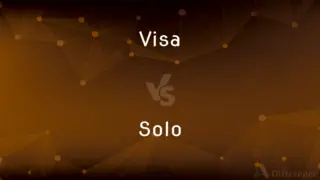Printed Book vs. eBook — What's the Difference?
Edited by Tayyaba Rehman — By Fiza Rafique — Published on December 9, 2023
A Printed Book is a physical publication made of paper, while an eBook is a digital version readable on electronic devices.

Difference Between Printed Book and eBook
Table of Contents
ADVERTISEMENT
Key Differences
A Printed Book is tangible, made from materials like paper and ink, offering readers a physical reading experience. In contrast, an eBook is an intangible, digital format of a book, accessible through devices such as tablets, eReaders, or computers.
The weight and size of a Printed Book can vary based on its binding, pages, and dimensions. On the other hand, an eBook occupies virtual space and can be carried in large numbers on a single device without increasing its physical weight.
When it comes to acquiring a Printed Book, one may purchase it from bookstores or borrow it from libraries, leaving a physical footprint. Acquiring an eBook often involves downloading it, which doesn't produce a tangible item.
Printed Books require manual storage space on shelves, desks, or in bags. In contrast, eBooks are stored electronically, often requiring minimal storage space on a device.
The longevity of a Printed Book might be affected by physical factors like wear and tear, water damage, or page yellowing. In comparison, an eBook doesn't deteriorate physically but might become unreadable due to technological changes or compatibility issues.
ADVERTISEMENT
Comparison Chart
Nature
Tangible
Digital
Storage
Physical space (shelves, bags)
Electronic devices (tablets, eReaders)
Acquisition
Purchase from stores or borrow from libraries
Download online
Durability Concerns
Wear and tear, water damage
Technological compatibility
Accessibility
Manual flipping of pages
Click or swipe on a device
Compare with Definitions
Printed Book
A bound publication on paper.
I bought a Printed Book from the local bookstore.
eBook
A book format stored and displayed electronically.
My tablet can store thousands of eBooks.
Printed Book
A paper-based medium for literary or artistic expression.
There's a special charm in reading a Printed Book.
eBook
An electronic counterpart of printed literature.
The eBook version was cheaper than the printed one.
Printed Book
A physical manifestation of written or graphic content.
She has a vast collection of Printed Books.
eBook
A virtual publication without physical pages.
Travelers often prefer eBooks due to their convenience.
Printed Book
An analog format of a text.
Some people prefer the tactile experience of a Printed Book.
eBook
A digitized text accessible through software.
Reading an eBook allows me to adjust font sizes.
Printed Book
A tangible text with pages and a cover.
The Printed Book feels good in my hands.
eBook
A digital version of a book read on electronic devices.
I downloaded an eBook for my flight.
eBook
Alternative spelling of e-book
Common Curiosities
Does a Printed Book have advantages over an eBook?
It's subjective. Some prefer the tactile feel and no battery dependency of Printed Books, while others value the convenience and portability of eBooks.
Can a Printed Book be converted into an eBook?
Yes, many Printed Books have eBook versions available.
Do eBooks generally cost less than Printed Books?
Often, yes. Production and distribution costs for eBooks are typically lower.
Can I gift someone an eBook?
Yes, many platforms allow gifting eBooks with a redeemable code.
Is there a special device needed to read an eBook?
eBooks can be read on various devices, including eReaders, tablets, and computers.
Can I resell my Printed Book?
Yes, Printed Books can be resold, while eBooks usually come with licensing restrictions.
Can I annotate in an eBook?
Most eReaders and eBook apps allow highlighting and note-taking.
Can eBooks have interactive elements?
Yes, some eBooks have hyperlinks, multimedia, or interactive features.
Are all titles available as both Printed Book and eBook?
Not always. While many titles exist in both formats, some might be exclusive to one.
Do Printed Books and eBooks have the same content?
Typically, yes, though eBooks might sometimes include additional interactive elements.
Share Your Discovery

Previous Comparison
Good Friday vs. Easter Monday
Next Comparison
Visa vs. SoloAuthor Spotlight
Written by
Fiza RafiqueFiza Rafique is a skilled content writer at AskDifference.com, where she meticulously refines and enhances written pieces. Drawing from her vast editorial expertise, Fiza ensures clarity, accuracy, and precision in every article. Passionate about language, she continually seeks to elevate the quality of content for readers worldwide.
Edited by
Tayyaba RehmanTayyaba Rehman is a distinguished writer, currently serving as a primary contributor to askdifference.com. As a researcher in semantics and etymology, Tayyaba's passion for the complexity of languages and their distinctions has found a perfect home on the platform. Tayyaba delves into the intricacies of language, distinguishing between commonly confused words and phrases, thereby providing clarity for readers worldwide.












































